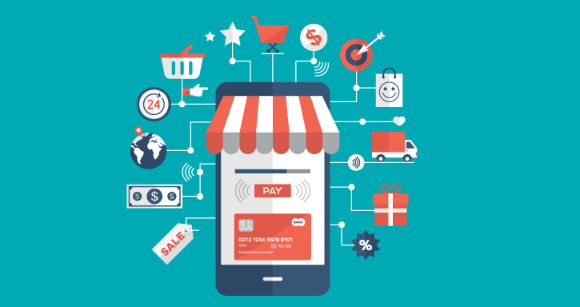When deliberating on whether to invest in a mobile app for your business, custom mobile app development emerges as a crucial consideration. In this digitally-driven world, mobile apps have become an integral part of our daily lives. From ordering food and booking rides to managing finances and shopping online, mobile apps have transformed the way we interact with businesses.
With the ever-increasing popularity of smartphones, many businesses are now faced with a critical decision: should they invest in building a mobile app?
In addition, when considering whether to build a mobile app for your business, it is crucial to collaborate with top app developers who owns the necessary expertise and experience. This article aims to explore the pros and cons of developing a mobile app for your business, assisting you make an informed decision.
Enriched User interaction
One of the primary benefits of having a mobile app is the ability to provide smooth user interaction. Unlike mobile websites, apps are specifically designed for smartphones, allowing businesses to leverage device features such as push notifications, cameras, location services, and offline access. These features enable businesses to deliver personalized content, targeted promotions, and real-time updates, thereby enhancing customer engagement and satisfaction.
Additionally, with custom mobile app development, you have the freedom to incorporate features, functionalities, and design elements that are precisely tailored to your brand identity and user preferences.
Improved Customer Loyalty and Retention
Mobile apps provide an opportunity to build stronger relationships with your customers. Through features like user accounts, personalized recommendations, loyalty programs, and in-app rewards, businesses can incentivize customers to return and engage with their app regularly. The convenience and accessibility offered by mobile apps foster customer loyalty and increase the likelihood of repeat purchases, ultimately boosting customer retention rates.
Enhanced Marketing and Sales Channels
Mobile apps offer businesses a direct and highly targeted marketing and sales channel. With push notifications, you can send personalized messages and updates to app users, promoting new products, discounts, or exclusive offers. Apps also allow for seamless integration with other marketing tools like social media, email marketing, and analytics, enabling businesses to track user behavior, gather valuable insights, and refine their marketing strategies.
Despite the numerous advantages, there are a few considerations to keep in mind before diving into app development:
Development and Maintenance Costs
Building a mobile app requires a significant investment of time, money, and resources. From hiring developers and designers to ongoing maintenance, updates, and bug fixes, the costs can quickly add up. It’s crucial to assess your budget and evaluate the long-term financial viability of maintaining an app before making a decision.
Additionally, the expertise of top app developers becomes particularly valuable when it comes to optimizing app performance, implementing robust security measures, managing mobile app development cost, and integrating features that align with your business objectives.
Market Saturation and App Discoverability
In the highly saturated app market, where millions of apps vying for attention, standing out and gaining traction requires more than just a unique idea. A robust marketing strategy is paramount to promote your app and ensure it gets noticed, staying relevant in the competitive digital landscape. Thorough market research and a well-defined target audience are foundational steps in this journey..
User Adoption and Retention
While mobile apps offer great potential for customer loyalty and retention, it’s crucial to understand user behavior and preferences. If your target audience is not accustomed to using mobile apps or if your app fails to provide a compelling value proposition, user adoption, and retention rates may be low. Conducting user surveys and testing prototypes can help identify potential barriers and improve the user experience.
Certainly! Here are some additional data and information to further support the decision-making process regarding whether your business should build a mobile app:
Mobile App Usage and Smartphone Penetration
According to Statista, as of 2021, there were 3.8 billion smartphone users worldwide, and this number is projected to reach 4.3 billion by 2023.
The average time spent on mobile apps globally increased to nearly 4 hours per day in 2021, indicating the growing importance of apps in users’ lives (App Annie).
Research by eMarketer revealed that 90% of mobile time is spent on apps, while only 10% is spent on mobile web browsers.
Consumer Expectations and Preferences
A survey by Clutch found that 42% of small businesses developed a mobile app to meet customer demand and expectations.
According to Google, 79% of smartphone users have made a purchase using their mobile device in the last six months.
Customers increasingly prefer the convenience and speed of mobile apps, with 69% of consumers preferring to order food through apps rather than websites (eMarketer).
Impact on Sales and Revenue
A study conducted by Criteo revealed that mobile apps generate higher conversion rates compared to mobile websites, with an average conversion rate of 3.2% for apps versus 1.3% for mobile websites.
In-app purchases contribute significantly to revenue generation, as highlighted by App Annie’s report, which estimated that in-app purchases accounted for 72% of global app store consumer spending in 2020.
Competitive Landscape and Industry Trends
Research by Clutch indicated that 71% of small businesses are already leveraging mobile apps or planning to build one to stay competitive.
In industries such as e-commerce, food delivery, and ride-hailing, mobile apps have become essential for businesses to remain relevant and gain a competitive edge.
The rise of emerging technologies like augmented reality (AR) and virtual reality (VR) presents new opportunities for businesses to enhance user experiences through mobile apps.
App Store Optimization (ASO) and Marketing
App store optimization techniques can improve app discoverability and organic downloads. Optimizing app titles, descriptions, keywords, and user reviews can significantly impact app visibility in app stores.
A study by StoreMaven revealed that 70% of app downloads come from search queries within app stores.
Implementing effective app marketing strategies, including social media campaigns, influencer partnerships, and app install ad campaigns; can drive user acquisition and app awareness.
Considerations for Different Business Models
For e-commerce businesses, mobile apps can offer personalized product recommendations, in-app promotions, and a smoother checkout experience, leading to increased conversions and customer retention.
Service-based businesses such as fitness studios, salons, or healthcare providers can leverage mobile apps for appointment scheduling, notifications, and loyalty programs.
Content-based businesses like news publishers or video streaming platforms can utilize mobile apps to deliver personalized content, notifications, and subscription-based models.
Conclusion
Building a mobile app for your business can have numerous advantages. However, it’s important to carefully consider the associated costs, market saturation, and user adoption challenges.
Conducting thorough market research, defining your objectives, and weighing the pros and cons will help you make an informed decision. However, working with top mobile app developers guarantees that your app will be crafted to the highest industry standards, ensuring its success and longevity in the competitive app landscape.
Ultimately, a well-designed and strategically implemented mobile app can be a powerful tool to drive business growth, boost customer engagement, and stay ahead in the digital landscape.
In last, investing in custom mobile app development empowers your business to deliver a unique and engaging app experience that resonates with your target audience, fostering increased user satisfaction and business growth.



